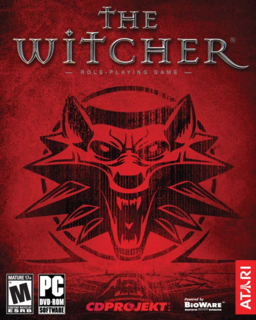The Witcher is the rough gem nestled under a mound of deceptively flashy yet unsatisfying RPGs.
The Good: Spectacular narrative populated by an interesting, fleshed-out universe that feels significantly different based on your in-game choices; great character development, in story and gameplay; consistently awesome soundtrack; innovative gameplay, made a challenge at highest difficulty levels
The Bad: Bugs; a few poor voice actors
The Ugly: Disappointingly rough presentation in most aspects of the game
This game was genuinely saved by its completely gratuitous re-release in 2008, with the developers ushering in the much-needed Enhanced Edition. In any other state, this game is unplayable. But with the coming of polished graphics, a revamped script, and general gameplay improvements, gamers can finally experience The Witcher in its prime (though it still wasn't up to par with AAA titles). It's got a fairly standard artistic direction boosted to look okay (with further texture packs), and most animations are unconvincing for a game that could have been this immersive, but what really stands out is how it's all delivered to you.
Over the course of the story's five main chapters, you're presented with a (relative to other RPGs) small set of locations to traverse. But this was made to work to the game's benefit. Instead of losing believability of scope in providing some shoddy fast-travel system, you're limited to fully fleshed out and fully explorable scenes. And in the end, you get to know these scenes (and love them with a pleasant familiarity thanks to their accompanying musical scores) like the back of your hand. Instead of trying to seem massive in scope while only covering a small amount of land (cough, Bioware), The Witcher covers a small area to begin with, and then gives you complete control as to how you approach and handle your quests. It all works to a more cohesive universe that I think works better than the methods of other games.
The narrative itself is bolstered by the works of Andrzej Sapkowski, and it is truly spellbinding. With an interesting, mature universe suffering from realistically mature problems, multiple major well-developed factions with fully thought-out backstories and motives, and multiple branching points (with absolutely stunning hand-drawn artwork delivered at focal points) in the narrative, it could have made for one of the most immersive experiences, but for the constant hiccups and oddities.
These faults in general presentation are frequent, and they're simply something that the player is going to have to make a conscious decision to overlook if he is to have a good time. As disappointing as that is, this decision is unavoidable. Flickering loading screens, awkward dialogue introductions and cutscene flow, and idiosyncratic movement design merely begin the list of annoyances. They're not really bugs -- just strange design choices and places where there could have been more polish added... a director's touch, if you will. Nevertheless, they're there (and constantly), and they ruin an otherwise immersive experience.
The actual gameplay doesn't suffer from as many oddities in design as the story delivery does, though it does take getting used to in its own way. You'll get a brief tutorial and introduction in the prologue, but it will probably take longer than that before you fully grasp the breadth of options (and their usefulness) available to you. Combat has received many complaints for being repetitive, but I am convinced that is only on lower difficulties, where you can click-wait-click-wait-click through every single fight. On higher difficulties you are forced to plan your encounters more strategically, and this is where things get interesting. There are a wealth of unique, innovative mechanics to discover here, and it is a joy to master them and be able to tackle the game's challenges on the highest difficulty (or even with increased difficulty mods!).
Another satisfying component to The Witcher is the sound design. Fully revamped voice acting has been significantly improved (though a select few actors haven't and still distract somewhat). To a greater extent, the soundtrack (though unimproved from the original -- it didn't need it) is awesome. Gritty and exciting at times, plaintive and soothing when it needs to be, and moody and unsettling whenever it can, almost every single track is memorable, with a few being particular stand-outs. And this effect is bolstered by how much time you spend in each area with each track; you'll come to subconsciously hum to these tunes before you realize it.
Graphics: 8/10
Gameplay: 9/10
Story: 9.5/10
Sound: 9/10
Presentation: 5/10
Value: 10/10
Tilt: 9.5/10
Overall Impression: 9.0/10
But what really keeps you coming back is not the music and not the gameplay (though those are certainly awesome components to the game), but it's the story that keeps you bearing those constant moments of awkwardness with spartan resilience. It's how the quests you thought were side-quests had an impact on how the main story panned out, it's how easy it is to sleep with every female NPC in the game (kidding!), it's how different your experience will be based on your decisions, and it's how you actually care about these decisions because the game has convinced you that this world has meaningful problems and that its characters are worth discovering. And, for all its faults, The Witcher is still an awesome game, and I'd highly recommend it to anyone willing to get past them.

